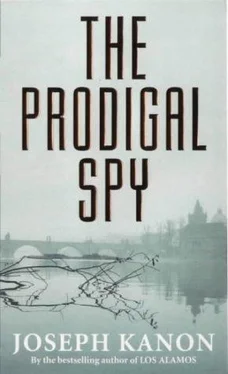“It’s not polite to stare, you know.” A woman’s voice, next to him.
“Sorry. Was I?” he said, turning to her, embarrassed.
But she was smiling. “I wish someone looked at me that way. She’s very pretty. Are you together?”
“Sort of,” he said, taking her in. She was still an attractive woman, but her face was loose and round, padded, Nick guessed, by years of too many extra glasses of wine. She seemed slightly drunk, shiny and amused, but not fuzzy.
“Sort of.” She laughed. “Well, you will be, if you keep that up. Youth,” she said, suggesting she’d enjoyed hers. “I tell you what. You just look and pretend to talk to me. I don’t mind a bit. I’m Doris Kemper, by the way. Jack Kemper’s wife.” She spoke the name, unknown to Nick, as if it guaranteed instant recognition.
“Nick Warren.”
“Ah. Larry’s son?”
Nick nodded.
“Well, that explains it. Your father always had an eye for the girls.”
“Really? Did you know him?”
“Not that way, if that’s what you mean. But I must say, I always wondered a little,” she said, oddly flirtatious. “He was quite the man about town. Do they use that expression anymore? Of course, this was all about a million years ago. Thank you,” she said to the waiter refilling her glass. “You can’t imagine how different Washington was then. People had fun.”
Nick watched her take another drink, trying to imagine her slim and eager for a night out. It occurred to him that if he just smiled encouragingly he wouldn’t have to talk at all.
“Well, they did,” she said, misinterpreting his look. “Of course, children don’t believe their parents were ever young. I know mine can’t. Then I heard he got married. We were overseas and I thought, well, that’s that. They’ll be hanging crepe all over town. If it lasts. But here you are, so I guess it did.”
“Where overseas?” Nick said, making conversation.
“Oh, everywhere. Athens. Rabat. Everywhere you had to boil the water.” She laughed to herself. “We were in Delhi for four years-that was the longest stretch.”
“Did you like it?”
“Well, Jack did. I had the children to raise. You know the tropics-one little scratch, and before you know it, it’s infected. You had to watch all the time. And the snakes.” She waved her hand, dismissing India, and when he followed it he found himself looking across the table again. Molly was listening to one of her suitors, fork poised in the air, her bare arms pale in the candlelight. He wondered if they would sleep together tonight. She’d stayed for dinner.
“You do have an eye,” Doris Kemper said. “I suppose he passed it on.” She picked up her glass. “Now tell me about yourself. What are you doing in London? Are you a lawyer too?”
“No, I’m finishing a degree at LSE.”
“That sounds interesting,” she said, clearly not believing it. “What in?”
“At the moment I’m doing research on the McCarthy period. You know, the witch-hunts.”
“People study that? Now I do feel old.”
“My professor’s writing a book about it.”
“But it’s such an exaggeration. Witch-hunts. I suppose to young people-but really, you know, the whole thing has been blown all out of proportion. I remember the loyalty oaths. We all had to do that. The army hearings. But to hear people talk, you’d think that’s all that was going on. Not any of the good things. Most people didn’t even notice.”
“HUAC held over two hundred hearings then,” Nick said calmly, a statistician. “Three thousand witnesses. And that was just HUAC. Not McCarthy.”
“Really?” she said, too surprised to be offended. But she was already moving away, the lesson of a hundred dinner parties. “Of course, we were overseas most of the time.”
She leaned back to let the waiter remove her plate and looked at Nick as if the new angle had suddenly brought him into focus. “Now I remember,” she said. “Larry’s wife. She had a child. That’s right. There was a boy-” She stopped. “Oh.” Nick could see in her slack face the rest of it coming back to her. “I’m so sorry. I didn’t-” She floundered, in such obvious distress that Nick, almost as a reflex, helped her.
“That’s all right,” he said quietly.
But it wasn’t. It happened so rarely now that he was unprepared for it, that moment when someone knew. He felt the sinking in his stomach, always the same, found out by the giant pointing finger. He wished he weren’t still high, unguarded, because now it would all come back. He knew the sequence, the pictures that would flash through his mind and always end with the woman lying twisted on the roof of the car. Instead he turned to the bright table, willing himself to be distracted by the opulent silver and the spray of flowers, an imperial banquet. Doris Kemper, who misinterpreted the gesture and thought he was angry, put her hand on his arm.
“I didn’t mean-” she said, and because she was silly but still kind, Nick smiled back, letting her off the hook.
“I know,” he said. How quickly it could happen, he thought, when you weren’t expecting it. But that was his problem, not hers. She never meant a thing. She’d had a life of amahs and swimming pool parties and only remembered the snakes, dreaming of Maryland. And now, of course, she’d be curious. He could already see the irresistible questions forming in her eyes.
They were both rescued by the tinkling of a knife against a glass as the ambassador rose to propose a toast. Not a speech, he said genially, just a word of welcome, because it was always good to see old friends and particularly good when those friends were about to render a service to their country. They were all aware of the importance of Larry’s mission, and they were all grateful, he was sure, that the mission had been placed in such competent hands. If there was progress to be made, he would make it, and he carried with him, at the very least, the hopes and good wishes of everyone at this table and countless other tables back home. There was a little more, and a few ‘hear, hear’s, and they raised their glasses. Nick raised his too, feeling more than ever the anomaly of his position, the son of a traitor invited to sit at the high table. But Larry, smiling modestly at the group, seemed entirely at ease, and his mother, on the ambassador’s right, looked radiant. No one, in fact, saw anything but a happy family, not even Doris Kemper, who thought he had an eye.
The table was breaking up now, heading into the sitting room for coffee, and when he looked over at Molly towering over her diplomats, who turned out to be short, his mood changed. The hell with them all, tangled up in their money and pious hopes for Paris. Their world, not his. He was going to spend an evening with a girl who’d actually met someone in the Steve Miller Band. But when she returned his look she seemed nervous, flustered by the toast, as if the evening had been a high and they were coming down, back where they started, and he wondered if they would sleep together after all.
“Good luck with your project,” Doris Kemper said, shaking hands.
“I’ll try to look for the good things,” he said pleasantly.
“You do that.” She smiled, almost winking. “It’s still the greatest country in the world.”
The informality of the coffee hour made it easier to slip out early, and after paying his respects to the Bruces, he collected Molly and headed for the door. A hug and faint protest from his mother, but no one else seemed to mind, absorbed on their side of the generation gap.
“She’s a nice girl,” Larry said when Molly went to get her coat. “I thought you said you weren’t seeing anybody.”
“I’m not seeing her yet,” Nick said. “First date.”
Читать дальше












